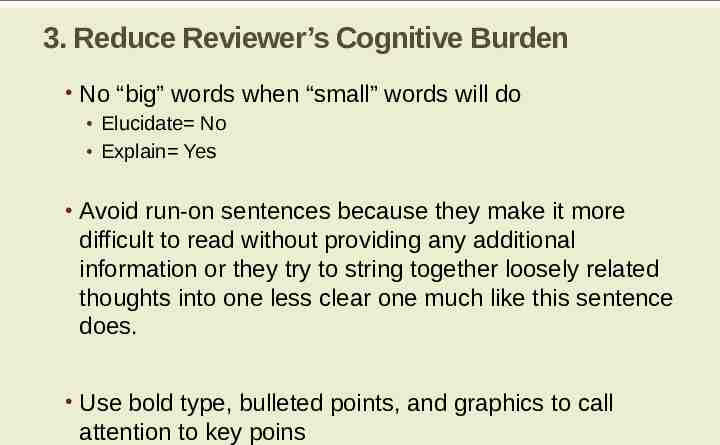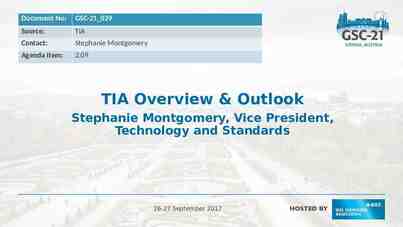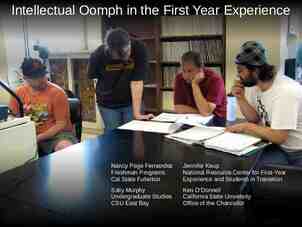The Basics of Grant Writing Mike Mitchell, Proposal Development
38 Slides688.73 KB

The Basics of Grant Writing Mike Mitchell, Proposal Development Coordinator Office of Proposal Development Florida State University

About Me Grants Consultant for FSU Faculty Former Program Manager for Florida Office of Energy Received 17 million funding from US Department of Energy and Department of Agriculture Background in Alternative Fuel Vehicles, Renewable Energy, and Sustainability Policy/Programs Office of Proposal Development Florida State University

Agenda The Players The Funders The Reviewers The Applicant The Planning Ideas Finding funding Timeline Outline The Proposal Questions to answer SMART goals Budgeting Rules and Regulations Office of Proposal Development Florida State University

GOOD IDEAS DO NOT GET FUNDED Office of Proposal Development Florida State University

GOOD IDEAS THAT ADVANCE THE FUNDER’S AGENDA GET FUNDED Office of Proposal Development Florida State University

The Funder’s Agenda “Select projects that will enable us to achieve our goals” Your project must be a good fit for the funder’s priorities. You must understand these priorities BEFORE you start writing a proposal. Look at: Funder’s Website (About Us, Priorities, History, etc.) Strategic or Annual Reports Speeches/Presentations by Top Officials Previous Awards or Awardees The Funding Opportunity Announcement Office of Proposal Development Florida State University

The Reviewer’s Two Types of Reviewers: Type 1: Works for the Funding Agency Motivation: Select projects that have a high likelihood of achieving the funding agency’s priorities, and make their organization look good. Type 2: Volunteer or “Voluntold” Motivation: “Let’s get this over with, but do a good job” Reviewers (usually): Are not experts in your specific area of research Have to read a lot of proposals in a relatively short time Form an opinion on the first page and look for reasons to validate that decision

The Applicant Motivation “ ” This is a sales pitch, you are selling yourself/your research You need to convince the reviewers, and the funder, that your idea: 1. 2. 3. Is viable and has intellectual merit Fits the funder’s agenda and goals Is better than the other proposals submitted

The Planning By failing to prepare, you are preparing to fail. - Ben Franklin

Find Funding Pivot Searchable database of public and private funding opportunities Set up saved searches Find collaborators Contact Kate Herron ([email protected]) with any questions Office of Proposal Development OPD farms out targeted, external funding opportunities Based off of your Pivot profile Keep your Pivot profile up-to-date Council on Research and Creativity Internal, “seed” funding More on OPD website under “Funding Opportunities”

Read the Funding Opportunity When is it due? Who is the Program Officer? Do you know them, or have you talked to them before? How many awards will be made? What is the maximum award amount? Is cost-share required? Is it a limited submissions program? Are you eligible? Read the description specifically for the kinds of projects they are looking for

Identify Collaborators Is this a 1-person project, or do you need a team? Have you worked with someone before who would be a good fit for this project? Do you want to participate in a team, but not necessarily lead? Is this an FSU FOCUS Program? If so, add your name to the interested parties list on OPD’s website

Identify Necessary Resources Do you have (or need) preliminary data? Do you have the necessary equipment for the project? How will you meet cost-share requirement? If it is a team project, would you like OPD coordinating assistance? Have you identified an editor?

Other Considerations Start as early as possible Some programs are offered at relatively consistent intervals (e.g. due dates every May) Other programs issue a “Notice of Intent” several months prior to the funding opportunity. Is this the RIGHT opportunity for you? Have you published any papers on this topic? Do you have a history of funding with this agency? Do you have the time to commit to writing a good proposal? Do you have the time to commit to conduct the project?

The Proposal

Heilmeier’s Catechism Series of questions attributed to former DARPA program manager George Heilmeier. Every proposal, regardless of agency, needs to answer these questions.

#1: What are you trying to do? Articulate your objectives using absolutely no jargon Examples: This proposal describes our plans to design, develop, and evaluate evidence-based assessments embedded in a digital game. The Integrated Clinical Neuroscience (ICN) Training Program will provide predoctoral students in Clinical Psychology and Neuroscience with didactic training, skills, and research experiences to foster independent careers with a focus on translational research on dysregulated behavior.

# 2: How is it done today, and what are the limits of current practice?

#3: What's new in your approach and why do you think it will be successful?

#4: Who cares? If you're successful, what difference will it make?

#5: What are the risks and the payoffs?

#6: How much will it cost? How long will it take?

#7: What are the midterm and final "exams" to check for success?

SMART Project Metrics Specific: Clear and focused to avoid misinterpretation. Should include assumptions and definitions and be easily interpreted. Measurable: Can be quantified and compared to other data. It should allow for meaningful statistical analysis. Attainable: Achievable, reasonable, and possible under conditions expected (i.e. budget and timeframe). Relevant: Fits with the funder’s, FSU’s, and your own career and research goals. Timely: The work is doable within the performance period of the award. Office of Proposal Development Florida State University

Not SMART: This project will examine middle and high school teachers to see how they learn, what influences their teaching, and will use the results to help them be better at their jobs. Office of Proposal Development Florida State University

SMART: This project will conduct a statewide survey of 1,047 mathematics teachers and 35,304 students in 6th through 8th grades in 201 middle schools, and case studies of eight middle schools in Missouri to address the following research and educational objectives: 1) examine the nature of mathematics teachers’ opportunity to learn for instructional improvement, 2) examine how work contexts influence the quality of teacher learning opportunities, 3) examine the impact of teacher learning opportunities on changes in student mathematics achievement over four years, and 4) work with district and school administrators to promote instructional improvement and student achievement by effectively providing learning opportunities to mathematics teachers. Office of Proposal Development Florida State University

Commonly Recommended Changes

1. Don’t Title the Proposal like a Publication Article Titles should be: Clear Concise Interesting A good title makes the proposal more memorable Especially important for proposals to private foundations Think about what would “look good in the press”

Example A general presentation on the mechanics of proposal preparation with a secondary specific focus on the National Institutes of Health vs. The Basics of Grant Writing- NIH

2. The “What are you doing?” Statement The proposal should state within the first paragraph exactly what you are proposing to do Many people give in-depth backgrounds of the problem which build up to the reveal of their proposed solution Good for novels, bad for proposals Lead with the solution, then explain why the problem is important

3. Reduce Reviewer’s Cognitive Burden No “big” words when “small” words will do Elucidate No Explain Yes Avoid run-on sentences because they make it more difficult to read without providing any additional information or they try to string together loosely related thoughts into one less clear one much like this sentence does. Use bold type, bulleted points, and graphics to call attention to key poins

4. If you have a point, make it Avoid ambiguity at all costs Tell them exactly what you want them to think Don’t ever leave it up to the reader to decide what you mean Bad “The results of our experiment are shown in figure 1.” “Based on our preliminary data, the next step in the project is clear.” “I will work with my collaborator to complete the project”

5. Don’t Neglect the Non-Research Project Management Plans Education/Outreach Plans Deliverables Team Qualifications A poor job on any of these can be the difference between equally good research proposals

6. Don’t Neglect the Non-Narrative Proposals also require additional documentation beyond the project narrative Biosketches/CV’s, letters of support, equipment and facilities descriptions, data management plans, post-doc mentoring plans, etc. These will take longer than you think to collect and format Not completing these as instructed can get you rejected without review

Budget Ask for exactly what you need If you “pad” the budget with extra expenses, reviewers will call you on it If you ask for too little, reviewers will question if you can accomplish your tasks Make sure to budget for all tasks “How are they going to do it if they don’t have any money?” Work with your department/college financial staff to complete the budget according to the funding opportunity’s instructions.

The Process Make sure that your proposal follows FSU’s internal process for submission to the funding agency. If the project involves Human Subjects, Animal Subjects, or Hazardous Material at all, you must contact the correct office to obtain approval. Proposal’s are due to Sponsored Research Administration or the Research Foundation at least 3 days prior to the funding agency deadline.

Questions?

Mike Mitchell Proposal Development Coordinator 850-644-9511 [email protected] @FSU OPD Office of Proposal Development Office of Proposal Development Florida State University Florida State University






